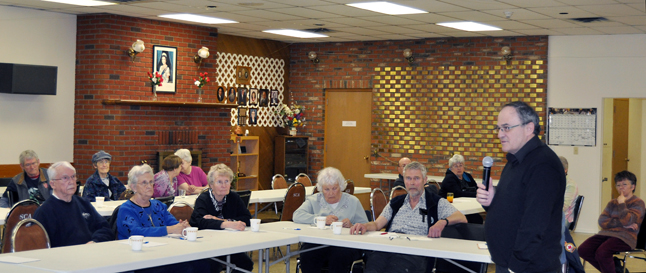
By David F. Rooney
Canada needs — but has a long way to go before it will get — a national strategy on Alzheimer’s and dementia, says Opposition MP Claude Gravelle.
“I’d like to say we need to educate people, but what we really need to do is educate politicians,” he told a group of 25 people who gathered at the Seniors’ Centre to hear a short presentation about his Private Member’s Bill in the House of Commons. His bill is years away from becoming law — if that, in fact, ever happens. Most Private Member’s Bills fail. Gravelle’s is one to two years away from even reaching the second reading stage. Be that as it may, he said a number of other MPs including some from the Liberal and Conservative parties agree that a national strategy is required.
There currently are about 500,000 people who suffer from Alzheimer’s and dementia and that number is expected to double and even triple as Baby Boomers age into their 70s, 80s and beyond.
“Alzheimer’s patients are going to double in a very short period of time and will even triple,” he said, adding that unlike many other advanced countries, Canada does not have a national strategy agreed upon by federal and provincial health ministers.
In some provinces there is a mix of government and private care providers, in others only private care and others still only government care. There are no common standards and in many individuals cases spouses and children attempt to care for their afflicted loved ones until they can no longer do so.
Trying to care for someone with Alzheimer’s or dementia is nightmarish. Many of these sick people are cantankerous, stubborn and sometimes aggressive and violent. They require levels of care beyond what their kids or usually aged spouses can often provide.
Gravelle, who was in Revelstoke with his wife to visit their son, said his strategy would seek a national consensus on how to deal with this complex problem.
“I’d like to get the federal and provincial health ministers in a room and watch them come to an agreement,” he said.
An agreement should try to allow patients to stay at home as long as possible while providing family caregivers with the resources, including professional help, that they need to keep them at home. Consigning them to hospitals and long-term-care institutions, which is what now happens all too often, will ultimately prove to be a true financial burden.
Gravelle recommended that people concerned about this issue should write to their MLA, MP, federal and provincial health ministers, their premier and the prime minister.
To find out more, please go to Gravelle’s website. You can also click here to read another newspaper article about the strategy.
Please click here to go to the Alzheimer’s BC website.



